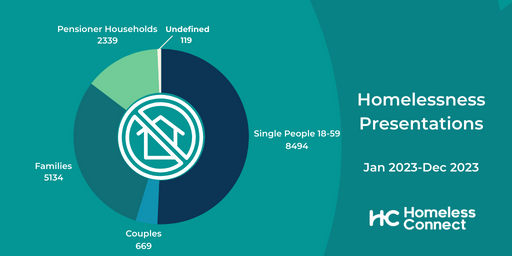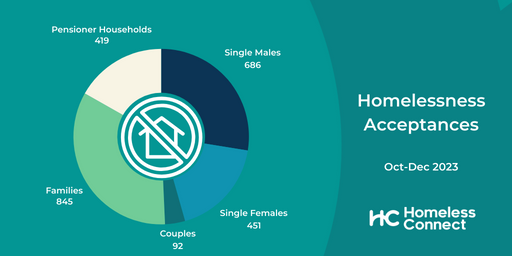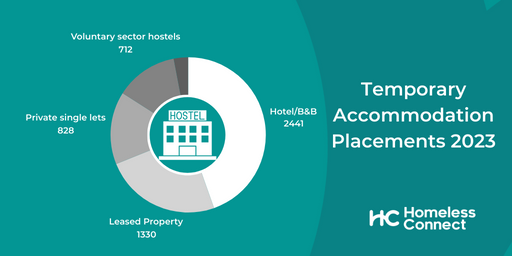What is homelessness?
To be considered homeless under the law in Northern Ireland, you don’t have to be roofless. If you are currently living in a property which is unreasonable for you to remain in, or you are threatened with homelessness in the next 28 days, you may be considered as being homeless.
Why do people become homeless?
There are a wide range of reasons. Some of the most common include the following:
- Breakdown of sharing arrangements
- Relationship breakdown
- Domestic abuse
- Loss of rented accommodation
- Intimidation
- Physical or mental health
- Addictions
- Poor quality or unsuitable housing
- Leaving prison
- Debt or financial difficulties
In some cases, it can be several of these factors.
How many people are experiencing homelessness?
In 2023, 16,755 households sought assistance from the Housing Executive because of homelessness. Households includes single people, couples and families with children.
Is everyone entitled to help?
The Housing Executive has the legal responsibility for homelessness in Northern Ireland. People who need assistance are assessed using legal criteria to see whether they are:
- Homeless/threatened with homelessness
- Eligible for assistance
- In priority need
- Intentionally homeless.
Usually while this is being assessed, people will be provided with temporary accommodation until a decision is made about whether the Housing Executive has a legal duty to house. This is known as Full Duty Applicant status or FDA. People in this situation will continue to be provided with temporary accommodation until social housing becomes available.
Because of housing shortages, the length of time on the waiting list for social housing can run into years.
In 2023, 11,087 households were accepted as homeless by the Housing Executive.
What is temporary accommodation?
It can be divided into five types.
- Voluntary sector hostels (usually charities)
- Housing Executive hostels
- Single Lets (temporary privately rentals)
- DIME (Dispersed Intensively Managed Emergency Accommodation)
- Hotels and B&Bs (sometimes referred to as non-standard)
In 2023, 10,813 placements were made in temporary accommodation. 2,441 were made to Hotels/B&B (43.6%), 1330 to leased properties (41.2%), 3811 to B&B and hostel accommodation (23.8%), 828 to private single lets (14.8%) and 712 to voluntary sector hostels (12.7%). Such is the pressure on the system at the current time that the Housing Executive has been forced to make a lot of use of B&B and hostel accommodation.
In January 2023, 4,556 households were living in temporary accommodation, an increase of 121% on January 2019.
What can I do to help people experiencing homelessness?
There are different ways you can help:
- Show compassion. People experiencing homelessness often face significant stigma due to what they are going through. This can lead to verbal and even physical abuse. Do not rush to judgment as to why a person may be experiencing homelessness. See the human in front of you; each and every person experiencing homelessness is a unique, unrepeatable human being worthy of dignity and respect.
- If you are in a position to financially support charities in the homelessness sector, this will be hugely appreciated.
- Make your voice heard. If we are to prevent and reduce homelessness here, we need political leadership to see it come to pass. Contact your MLAs to call for the change we need to see to reduce homelessness here.
- Many organisations in the homelessness sector would love to have additional volunteers. These can take a huge range of different forms depending on the organisation concerned.




